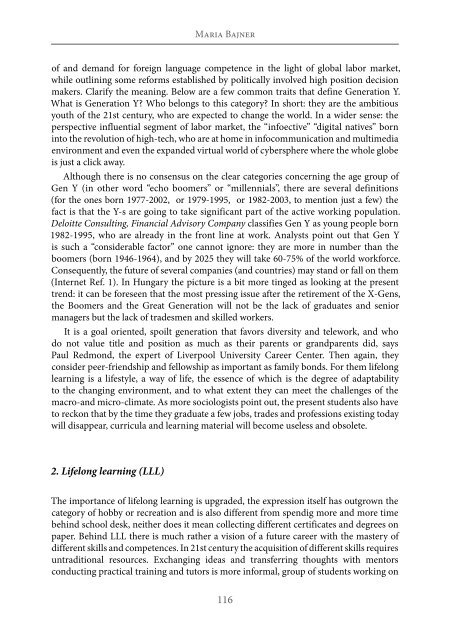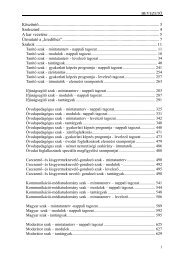ACTA SZEKSZARDIENSIUM - Pécsi Tudományegyetem Illyés Gyula ...
ACTA SZEKSZARDIENSIUM - Pécsi Tudományegyetem Illyés Gyula ...
ACTA SZEKSZARDIENSIUM - Pécsi Tudományegyetem Illyés Gyula ...
Create successful ePaper yourself
Turn your PDF publications into a flip-book with our unique Google optimized e-Paper software.
Maria Bajner<br />
of and demand for foreign language competence in the light of global labor market,<br />
while outlining some reforms established by politically involved high position decision<br />
makers. Clarify the meaning. Below are a few common traits that define Generation Y.<br />
What is Generation Y? Who belongs to this category? In short: they are the ambitious<br />
youth of the 21st century, who are expected to change the world. In a wider sense: the<br />
perspective influential segment of labor market, the “infoective” “digital natives” born<br />
into the revolution of high-tech, who are at home in infocommunication and multimedia<br />
environment and even the expanded virtual world of cybersphere where the whole globe<br />
is just a click away.<br />
Although there is no consensus on the clear categories concerning the age group of<br />
Gen Y (in other word “echo boomers” or “millennials”, there are several definitions<br />
(for the ones born 1977-2002, or 1979-1995, or 1982-2003, to mention just a few) the<br />
fact is that the Y-s are going to take significant part of the active working population.<br />
Deloitte Consulting, Financial Advisory Company classifies Gen Y as young people born<br />
1982-1995, who are already in the front line at work. Analysts point out that Gen Y<br />
is such a “considerable factor” one cannot ignore: they are more in number than the<br />
boomers (born 1946-1964), and by 2025 they will take 60-75% of the world workforce.<br />
Consequently, the future of several companies (and countries) may stand or fall on them<br />
(Internet Ref. 1). In Hungary the picture is a bit more tinged as looking at the present<br />
trend: it can be foreseen that the most pressing issue after the retirement of the X-Gens,<br />
the Boomers and the Great Generation will not be the lack of graduates and senior<br />
managers but the lack of tradesmen and skilled workers.<br />
It is a goal oriented, spoilt generation that favors diversity and telework, and who<br />
do not value title and position as much as their parents or grandparents did, says<br />
Paul Redmond, the expert of Liverpool University Career Center. Then again, they<br />
consider peer-friendship and fellowship as important as family bonds. For them lifelong<br />
learning is a lifestyle, a way of life, the essence of which is the degree of adaptability<br />
to the changing environment, and to what extent they can meet the challenges of the<br />
macro-and micro-climate. As more sociologists point out, the present students also have<br />
to reckon that by the time they graduate a few jobs, trades and professions existing today<br />
will disappear, curricula and learning material will become useless and obsolete.<br />
2. Lifelong learning (LLL)<br />
The importance of lifelong learning is upgraded, the expression itself has outgrown the<br />
category of hobby or recreation and is also different from spendig more and more time<br />
behind school desk, neither does it mean collecting different certificates and degrees on<br />
paper. Behind LLL there is much rather a vision of a future career with the mastery of<br />
different skills and competences. In 21st century the acquisition of different skills requires<br />
untraditional resources. Exchanging ideas and transferring thoughts with mentors<br />
conducting practical training and tutors is more informal, group of students working on<br />
116




